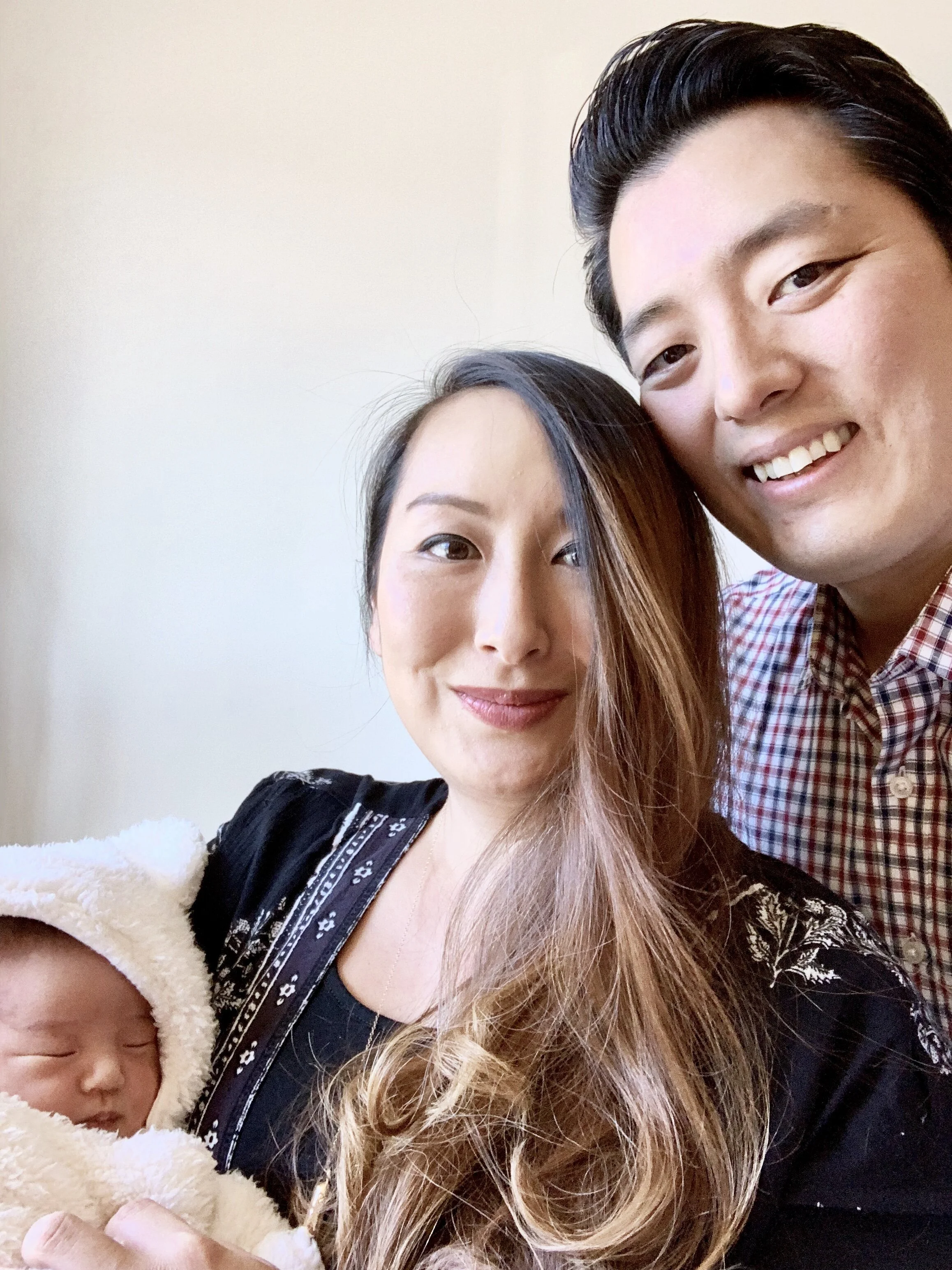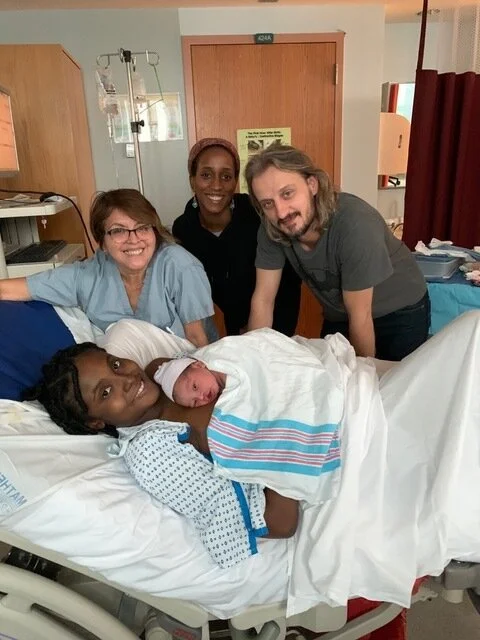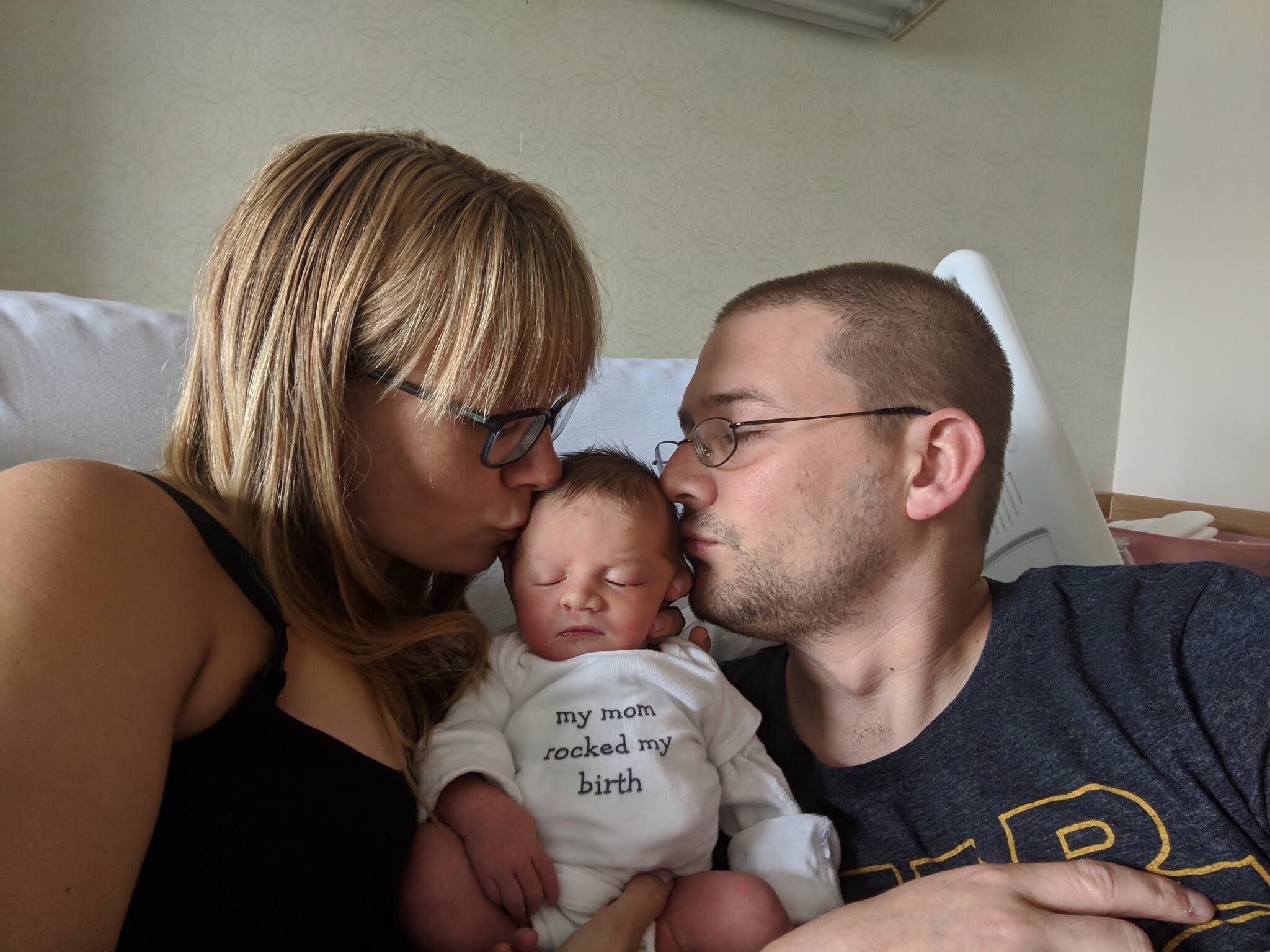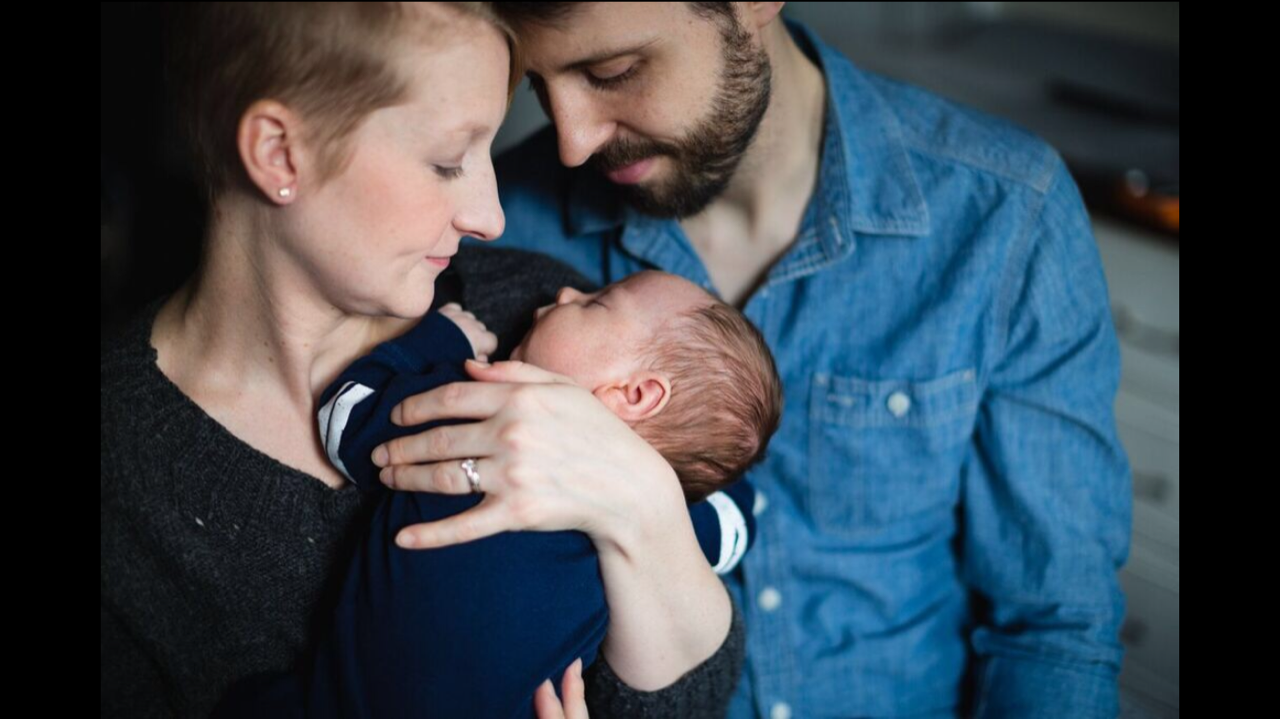The BIRTH MATTERS Podcast
Fertility Coach, host of the FERTILITY FRIDAY podcast, and author of THE FIFTH VITAL SIGN, Lisa Hendrickson-Jack, shares her expertise on the fertility awareness method as it pertains to folks who are trying to conceive as well as for those who've recently given birth.
Manhattan couple Jen & Zach share their son’s birth story. Desperate to avoid induction, having sex seems to do the trick and Jen’s water breaks. When they show up to the hospital hoping to just confirm the water broke and go home, they get checked into the hospital. While Jen does get to have the vaginal birth she hoped for, most of her other birth preferences require adjustment — including getting a different OB and doula than planned as well as several interventions she had hoped to avoid being used. As a Jewish couple, they’ll also describe their son’s bris.
Fertility warrior Jasmine Katatikarn, who struggled to have a child for six years, shares her fertility journeys. After multiple IUIs and her 2nd IVF, she was told that she had a less than 1% chance of having a baby and to stop trying. However, Jasmine didn’t give up.
Using her background as an artist, she applied an artist’s mindset to overcome her roadblocks and design a life that gave control of her fertility journey and life moving forward. Using her designer point of view and tools, Jasmine shows you how to take control of your own fertility journey as well.
As a result, she became pregnant within months of being told she had less than a 1% chance. Jasmine now has two kids, both through IVF. Today, you’ll hear details about her fertility journey, what led her into encouraging others along similar paths, and she’ll share a bit about the work she does to support parents who are on the TTC journey.
Early in the podcast’s first season, in episode 5, Julie shared her baby’s birth story. She returns today to share her fertility journey whereby it took several years of perseverance to successfully conceive and give birth to her healthy baby boy. The path to conceiving her son via IVF included unsuccessful IUIs (or intrauterine inseminations), a chemical pregnancy, early loss of twins, and switching care providers and hospitals along the way. She explains how her Christian faith created a bit of conflict within her at first about this pursuit, and she also describes some different opinions her family had about trying to conceive in alternative ways. Julie also goes into other emotional and relational aspects of the journey and for her, how valuable it was when she was able to shift toward feeling at peace with whatever the outcome. She wanted to share her journey in hopes that it can encourage others on a similar path.
Today we continue our fertility journey series and share the second part of fertility doula Alison Wehr’s 2 IVF and birth stories. Alison’s second path to conception was a smoother one; today she shares how quickly IVF worked this time around, how she wasn’t nearly as anxious this time, and will detail her second born’s birth story that started with her water breaking a few days before her estimated due date. After she shares her son’s birth story, she discusses how she got into fertility doula as well as birth and postpartum work.
In this and next week's episode, birth & fertility doula Alison Wehr shares stories of her two babies’ IVF conception and birth stories. *Trigger alert: this first part includes some stories of loss in the process of trying to conceive.* She spends early labor at a Broadway play with her husband and then shares about a post-Hurricane Sandy blackout just after they came home with baby.
Marise Angibeau-Gray, a Black mother and full spectrum doula, shares the story of 3 pregnancy losses -- one in each trimester -- that led up to her 4th baby’s birth story. (TRIGGER ALERT: Please note that this episode may be upsetting for anyone who has experienced pregnancy loss or trauma.) Marise shares aspects of the emotional journey as well as how she selected each of her care providers and eventually found an optimal fit who would give her customized care. She also shares insights on a couple of things that are NOT helpful to say to someone who has experienced pregnancy loss.
Today is part 2 of Adriane’s 2nd IVF and birth story. this is a story of a transfer from a homebirth in the pushing stage due to the fact that her baby was in an awkward position. We left off last week just before Adriane’s midwife advises them to transfer to the hospital. Today she shares how she was still able to have a vaginal birth, but also shares some of the challenges she faced in the hospital environment, particularly after the birth.
This episode kicks off our fertility journey series as postpartum doula and babywearing educator Adriane Stare, who shared her first baby’s conception and birth story in Episode 40, returns to share her 2nd baby’s Christmas Day birth story. This is a story of a frozen embryo IVF conception and then a planned home birth that needed to transfer to the hospital in the pushing stage that results in a vaginal birth.
When Erin shows up for her weekly prenatal appointment around 37 weeks without her partner due to Covid restrictions, she's caught by surprise when she’s told an induction is necessary because they don’t detect enough fetal movement. Erin & Mike share their story of a fairly uncomplicated induction in which baby has to go to the NICU for a short while.
Alissa describes how birth surprised her by not being the scary event she built it up to be in her head. She shares the story of her first baby's uncomplicated vaginal birth with an epidural, and then shares about how her struggles with breastfeeding led to the difficult decision to switch to bottle-feeding because of the negative effects it was having on her mental health.
Kirtan shares her baby's birth story — an unmedicated, vaginal birth in which she shows up at the hospital just in time to push. She also describes the anxiety she experienced with regard to breastfeeding and introducing solids, and also shares an entertaining story about the time she had to pump milk on an NYC subway on her way home from work.
Traci Stahley shares all 3 of her babies’ birth stories, which were fairly uncomplicated, vaginal births — the first being in NYC and the 2nd and 3rd in Indianapolis. She shares how, while her first two had no nursing issues and were actually avid breastfeeders, her third baby surprised them by having pretty significant feeding issues. They soon discovered that he had a condition called Laryngomalacia, where the tissue of the larynx is softer and floppier than normal. This created the challenges with breastfeeding and, later, some speech issues, both of which required some work with a speech therapist.
Simone Toomer, a Brooklyn-based Black doula, childbirth educator, lactation counselor, sleep educator shares her first baby’s uncomplicated birth story in a hospital in which she shows up pretty much just in time to push and give birth. Simone will also share a bit about the great work she’s doing to improve breastfeeding outcomes for Black families through nursing support groups with Chocolate Milk Cafe.
Mila goes into labor before she and her husband, Shawn, can finish shooting an episode of HOUSE HUNTERS. They share details about their hospital induction and their premature baby's stay in the NICU, and Mila shares about ways she addressed her struggles with clinical anxiety in the transition into parenthood.
First-time mom and preschool teacher Kelsey -- along with her midwife, Jenna Sood of Central Park Midwifery, and her doula, Christine Gibson -- shares her baby's unmedicated Manhattan hospital birth story.
A psychotherapist shares the story of her first baby's induction just past her due date due to elevated blood pressure. Toni uses strategies from her professional expertise in mindfulness & meditation to labor and give birth without pain medications and with the support of a doula, her husband, candles, dancing, celebration...and even a drum.
Today you’ll hear a story shared by Amayra, a Black woman living in NYC who initially planned to give birth at home due to her knowledge about the poor outcomes for Black birthing folks in hospitals. Things took an unexpected turn when she learned her baby had a cleft diagnosis so that she needed to switch to a hospital birth attended by midwives. Amayra shares how she intentionally chose Black care providers not only for her birth support team, including her doula, but also as she selected a surgeon during pregnancy to correct the cleft soon after birth. Amayra also provides a bunch of excellent tips for expectant and new parents toward the end, too, so be sure to listen to the whole episode.
Local NYC hospital midwife, Elaine Keller-Duemig, shares her own baby's birth story on this episode. Elaine was the care provider in last episode's 2 birth stories. In this episode, she shares her own baby’s birth story, attended by a midwife at her practice, Central Park Midwifery. This is a story of a shorter than average first-time labor and an unmedicated, vaginal birth.
Yuliya shares both of her babies’ birth stories of medically-indicated inductions with midwives & a doula and without pain medications. She shares how her background as a clinical psychologist helped her do the cognitive work needed to cope in natural ways with the intensity of labor and how working with a team who provide compassionate, patient-center care made a big difference.
Adriane Stare shares her very unusual fertility journey story of IVF as well as her subsequent, very personal choice to give birth to her first baby at home. She’s not only a mom of two, but is also a babywearing expert, postpartum doula, breastfeeding counselor, and the former owner of a baby boutique in Greenpoint, Brooklyn now called The Wild. She’ll share her 2nd IVF and birth story later on the season as we begin the series on fertility journey challenges.
The day before Nora’s & Michael’s firstborn’s 4th birthday, and about a week before their 2nd born turns 1, they share both of their stories of uncomplicated births at home. Listen to hear details of thoughtfully choosing the birth location and birth team that would be most likely to honor their hopes to have a peaceful and physiological birth both times. You’ll hear the benefits of prenatal physical training through the lens of Michael’s expertise as a personal perinatal trainer. They will both share the specific benefits of hiring a doula for both births, and will advise listeners to think carefully about what family members or others you’ll invite to be present for your labor through the tense dynamics they experienced the second time around.
Sarah & Chris share their story of a multiple-days-long, planned home birth that eventually transfers to the hospital. Ultimately, Sarah gives birth via c-section after her waters have been ruptured for 90+hours and there was meconium in the fluid. This amazing mama demonstrated heroic positivity and determination and, while birth didn’t go as she had hoped, they see it as a beautiful, positive birth of their firstborn baby boy.
Sarah & Chris share their story of a multiple-days-long, planned home birth that eventually transfers to the hospital. Ultimately, Sarah gives birth via c-section after her waters have been ruptured for 90+hours and there was meconium in the fluid. This amazing mama demonstrated heroic positivity and determination and, while birth didn’t go as she had hoped, they see it as a beautiful, positive birth of their firstborn baby boy.
After Amanda hires a midwife and a doula in hopes of an unmedicated, vaginal birth, she develops cholestasis later in pregnancy and has to be induced. When the baby’s heartbeat is too low for too long, their son needs to be born via cesarean month. Our 2nd story for Cesarean Awareness Month.
In today’s birth story, Sarah & Spencer receive an urgent call from their obstetrician just before their due date saying they needed to be induced immediately if they wanted Spencer to allowed to support Sarah in labor. Not wanting to give birth without support, they heed the call and head to NY Pres Weill Cornell for an uncomplicated vaginal birth. They describe the ways in which the environment was different in light of the pandemic, including testing, wearing masks, the hospital feeling quieter than normal, and more. They both share that, while they were grateful that Spencer was able to be present to support Sarah through labor and to be present for the birth of their baby, it was very disappointing that Spencer wasn’t allowed to go with her and baby to the postpartum unit and how Sarah regretted agreeing to the default shared room after birth.
Amidst the growing Covid-19 pandemic and stay at home orders, Natalie & Jackson share the stress they experienced late in her 3rd trimester when they learn that their hospital is no longer allowing partners to accompany the laboring person. They scramble to advocate for the decision to be reversed at Mt. Sinai East and are interviewed by multiple reporters along the way. They share how they were surprised when Natalie’s water broke a few weeks before the due date. Thankfully, baby waited to come just long enough for Governor Cuomo to issue an executive order requiring partners to be allowed in labor & the immediate postpartum. They’ll share aspects of the hospital environment across Natalie’s time in the hospital that will be relevant to anyone giving birth during a pandemic, such as there being very little traffic getting to the hospital, being tested for Covid upon admission, the hospital being uncrowded, and having to wear a mask the whole time they were there.
When the Covid-19 pandemic starts getting real in March, Jackie & Michael try everything they can near their due date to help labor to start when their doctor wouldn't agree to induce until after her due date. A few days before her due date, Jackie's surprised when her water breaks. Because she sees meconium in the fluid and she was Group B Strep positive, they head to the hospital. They describe how both the induction and the pushing stage surprise them when it progresses more quickly than most. You'll hear the different ways that, in mid-March when Jackie gave birth, hospital precautions were ramping up moment-by-moment in one specific way that affected them. They also share the ways their pediatrician office's protocols changed across their first 3 visits. Jackie & Michael also talk about how valuable hiring doulas was through this journey into parenthood, even when it had to be virtual support for the actual labor.
Christine learns in her 33rd week of pregnancy that her baby has flipped to breech, or heads up, position. She scrambles to change care providers in hopes of having closer to the kind of birth she and her husband, Omri, wanted. While she wasn’t able to have the vaginal, unmedicated birth she had hoped for -- because it’s nearly impossible to find any care providers who are trained to safely deliver breech babies vaginally -- she opts out of the recommended scheduled cesarean and waits for labor to start spontaneously before having a surgical birth at Metropolitan Hospital (NYC). She and Omri advocate for specific things in the surgery that mattered to them, and their doula helps them know the smart questions to ask along the way. This is a story of strong self-advocacy and making informed choices, as well as building in support, to have as positive and healthy a birth as possible.
A few days before celebrating their daughter’s first birthday, Nissa & Brit share the story of an unexpectedly quick first labor with the support of a doula. You'll hear about how a preexisting condition Nissa has, Crohn's Disease, caused confusion when she actually went into labor. She shares the emotional challenges of a cancer diagnosis her mom got in the middle of Nissa’s pregnancy and mentions a therapeutic method that was helpful to her. She details how she thinks her background and training in acting was helpful in giving birth, while Brit explains how being a parent has helped him become a better, more present professional actor. They'll describe what it was like to meet their daughter for the first time, go through some of the ways they worked together as a team in the early weeks, and will point out strengths they've seen in each other as they've become parents.




























